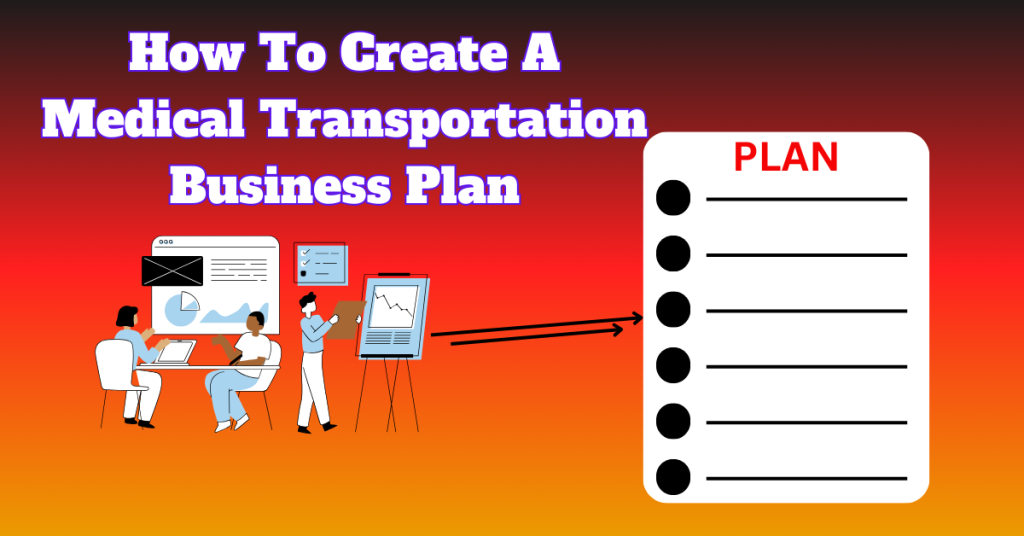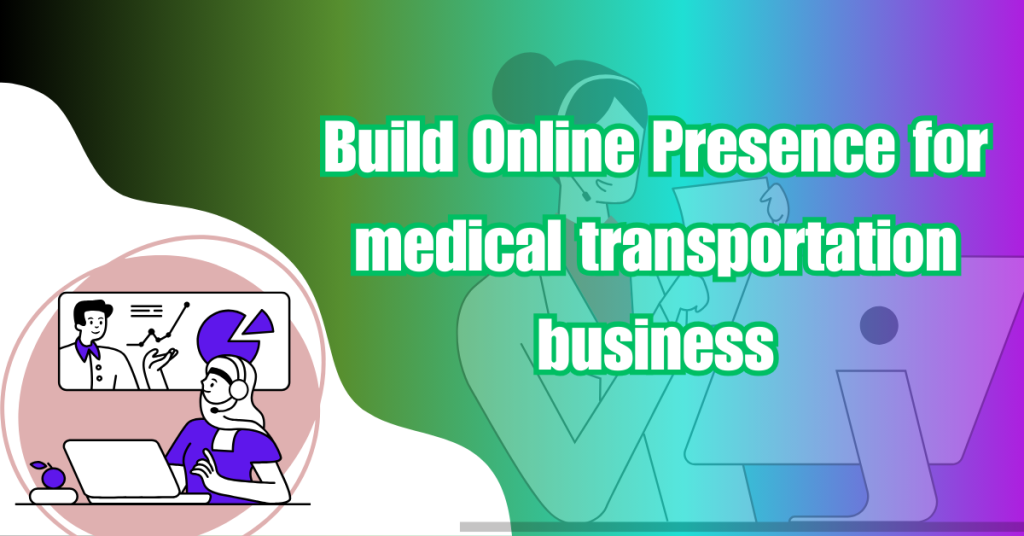The medical transportation business is one of the best services type businesses worldwide. By doing this business there are lots of people who generate millions of dollars but this medical transportation business is highly competitive in the healthcare industry. Are you scared?
Don’t be scared about it because if you have a good strategy, plan, quality service, skilled staff, and many more in your medical transportation business it will be a successful business.
So if you are an entrepreneur and you wanted to start medical transportation business from the beginning your first priority will be the individual patients cause there are two types of medical transportation businesses which are non-emergency and emergency lets dive into the article to learn more about medical business and best ways to start medical transportation business.
Table of Contents
Medical Transportation Business Plan
One of the critical aspects of starting a successful medical transportation business is having a well-structured business plan. A medical transportation business plan acts as a roadmap that outlines the company’s goals, strategies, and financial projections.
Firstly, it is important to define the target market and identify the specific services the business will provide, such as non-emergency transportation for individuals in need of medical assistance.

Additionally, the plan should outline the marketing strategies to attract healthcare providers and establish partnerships with hospitals, nursing homes, and rehabilitation centers. It should also address the operational aspects, including fleet management, staff hiring and training, and compliance with regulatory requirements. Moreover, financial projections should be included, covering costs, revenue forecasts, and strategies for ensuring profitability.
Overall, a well-crafted medical transportation business plan not only attracts potential investors but also provides a foundation for growth and future success.
Medical Transportation Business License Requirements
A medical transportation business license requires adhering to certain requirements to ensure the highest level of safety, quality, and professionalism.
Firstly, aspiring business owners must possess a valid driver’s license and maintain a clean driving record, as safety is of utmost importance when transporting vulnerable individuals. Additionally, obtaining liability insurance coverage is essential to protect both the business and its clients in case of unforeseen events. Background checks and fingerprinting may also be prerequisites to guarantee the credibility and trustworthiness of the business operators.
Furthermore, many states or municipalities require specific certifications or training in medical transportation protocols to ensure proper handling of patients and compliance with healthcare regulations. Evaluating and fulfilling these license requirements is a crucial step in establishing a reputable and successful medical transportation business.
Medical Transportation Business Income
Medical transportation businesses generate income through a variety of revenue streams, including private pay clients, insurance reimbursements, government contracts, and partnerships with healthcare facilities.
Private pay clients often constitute a significant portion of a medical transportation business’s income, as individuals or their families are willing to pay for safe and reliable transportation to medical appointments.
Insurance reimbursements further contribute to the income, as medical transportation services are often covered by health insurance plans.
Moreover, securing government contracts can be highly beneficial, as many organizations and agencies rely on medical transportation services to ensure transportation for their constituents.
10 Best Ways To Start Medical Transportation Business
Research Business
Starting a medical transportation business can be a rewarding and valuable venture. However, proper research is essential to ensure its success and sustainability. The first step in researching a medical transportation business is to gain a comprehensive understanding of the industry.
Familiarize yourself with the specific regulations, requirements, and certifications necessary to operate in this field. Conduct market analysis to identify the demand and competition in your targeted area. Explore successful medical transportation businesses and analyze their strategies, services, and pricing models.

Additionally, consider reaching out to other professionals in the healthcare industry, such as hospitals and clinics, to assess their specific needs and potential partnerships.
By thoroughly researching the medical transportation business, you will be equipped with the knowledge and insights necessary to establish a thriving and impactful enterprise.
Marketing Analysis
Analyzing the market will help identify the demand for medical transportation services in your area and the existing competition. Furthermore, it would be prudent to assess the demographic and socioeconomic factors that influence your target market’s accessibility to your services.
By examining the purchasing behavior and preferences of your potential customers, you can effectively tailor your marketing strategies to meet their needs while staying ahead of the competition.
Additionally, performing a SWOT (Strengths, Weaknesses, Opportunities, Threats) analysis will enable you to identify your business’s internal strengths and weaknesses and external opportunities and threats.
This analysis will provide valuable insights on differentiating your medical transportation business, identifying unique selling propositions, and optimizing marketing efforts to reach your target audience effectively.

Create Business Plan
Creating a business plan for a medical transportation business is essential to ensure a successful and effective operation.
To begin, thoroughly research the market and identify the target customers, such as hospitals, nursing homes, and healthcare clinics. Understand their needs and preferences, including the type of transportation services required and the expected level of quality and reliability.
Next, evaluate potential competitors and determine what sets your medical transportation business apart from them. Consider factors like specialized medical equipment, well-trained staff, or technology-driven services.
Additionally, outline a comprehensive marketing and sales strategy to attract and retain clients, including building strong relationships with referral partners. Furthermore, analyze the financial aspects of the business, including pricing, revenue sources, and expenses such as vehicle maintenance and insurance.
Finally, create a contingency plan to address potential challenges, such as emergency situations or fluctuating demand. By following these steps, you can develop a well-structured and robust business plan for your medical transportation business, setting the foundation for its long-term success.
Legal Requirements
If you’re considering venturing into the medical transportation industry, it’s crucial to understand the legal requirements that come with operating such a business. Compliance with these regulations not only ensures the safety and well-being of your patients but also protects your company from potential legal issues.
As an entreprneur, you must ensure that your drivers are properly licensed and trained according to local and state guidelines.
Additionally, you will need to have appropriate insurance coverage that meets the specific needs and risks associated with medical transportation. It’s essential to familiarize yourself with laws related to patient privacy and confidentiality, such as HIPAA, as you will frequently handle sensitive medical information.
Furthermore, creating a comprehensive compliance program and conducting regular audits will help you stay ahead of evolving regulations, ensuring the longevity and success of your medical transportation business.

Set Business Structure
When starting a medical transportation business, it is essential to establish a solid business structure to ensure its success and sustainability.
Firstly, determine the legal structure that aligns with your goals and objectives. Options may include a sole proprietorship, partnership, limited liability company (LLC), or corporation. Conduct thorough research to understand the benefits and drawbacks of each structure, considering factors such as liability, taxation, and management flexibility.
Once you have chosen the appropriate structure, register your business with the relevant authorities and obtain any necessary licenses or permits. Additionally, create a comprehensive business plan that outlines your mission, target market, pricing strategy, marketing tactics, and financial projections.
Establishing a strong business structure lays the foundation for growth and enables you to provide reliable and efficient medical transportation services to those in need.
Hire Skilled Stuff
When it comes to running a successful medical transportation business, hiring skilled staff is essential to ensure the highest level of care and professionalism. The first step in finding the right candidates is to clearly define the skills and qualifications required for the job. This could include certifications such as CPR and First Aid, a valid driver’s license, and familiarity with medical equipment.
Once the requirements are established, it’s important to advertise the job opening on relevant platforms such as job boards and social media. Additionally, networking within the healthcare industry can help identify potential candidates with the necessary skill set.
During the interview process, it’s crucial to assess not only the candidate’s technical skills but also their ability to handle stressful situations, communicate effectively, and provide compassionate care.
Conducting thorough background checks and verifying previous work experience can further ensure that the selected individuals are reliable and trustworthy. Ultimately, by following these steps, a medical transportation business can hire skilled staff members who will contribute to the overall success and reputation of the company.

Set Cleare Pricing
Establishing transparent and fair rates is key not only for client satisfaction but also for achieving profitability and long-term success. Conduct thorough market research to understand your competitors’ pricing strategies and assess local demand.
Next, determine your costs, including vehicle maintenance, fuel, and employee wages, and factor in other expenses such as insurance and licensing fees. Consider the distance, time, and additional services required for each trip when setting your rates.
Finally, it is vital to openly communicate your pricing structure to clients and highlight the value and quality of your services to justify these prices. Remember, a well-defined and transparent pricing model will build customer trust and set your medical transportation business on the path to growth and profitability.
Take Insurence
Here are the key steps to take when acquiring insurance for your medical transportation business.
Firstly, identify your specific needs and risks associated with your operations, such as vehicle accidents or medical malpractice claims.
Next, research and compare insurance providers who specialize in medical transportation coverage. It’s essential to select an insurer with a strong reputation and a proven track record in the industry.
And, make sure to thoroughly review policies to ensure they offer comprehensive coverage for liabilities you may encounter. Don’t forget to inquire about coverage for your fleet of vehicles, as well as general liability coverage for accidents or injuries that could occur during patient transport.
Lastly, maintain open communication with your insurance provider to keep them informed about any changes in your business and to address any concerns or questions promptly. By taking these steps, you can secure the appropriate insurance coverage for your medical transportation business and provide peace of mind to both yourself and your clients.

Build Online Presence
To build a strong online presence for your medical transportation business, it is essential to start by creating a user-friendly and informative website that showcases your services, highlights your expertise, and provides easy ways for potential clients to contact you.
Leveraging social media platforms can significantly boost your online visibility, allowing you to connect with patients, healthcare providers, and potential partners. Building a powerful online presence also involves regularly posting relevant content, such as articles, blog posts, or videos, that not only educates and engages your audience but
also establishes your business as a thought leader in the industry. By investing time and effort into cultivating a robust online presence, you can effectively promote your medical transportation business, attract more clients, and ultimately thrive in this competitive market.
Create a Reliable Payment System
When it comes to running a successful medical transportation business, having a reliable payment system in place is crucial. Not only does it ensure prompt payments for your services, but it also fosters trust and credibility with your clients.
To create a reliable payment system, start by implementing secure and convenient payment options such as credit card processing and online billing. Utilize a reputable payment gateway that can securely handle transactions while adhering to industry regulations.
Consider implementing automated billing and invoicing systems to track and manage payments efficiently. Regularly update your payment policies and clearly communicate them to your clients, ensuring transparency and minimizing any misunderstandings.
By creating a reliable payment system, your medical transportation business can streamline financial processes, improve cash flow, and ultimately enhance customer satisfaction.
Faq
how to start a medical transportation business in Florida
Starting a medical transportation business in Florida can be a rewarding venture that provides a vital service to the community. Firstly, conduct thorough market research to identify the demand for such services. Obtain necessary licenses and certifications, ensuring compliance with local regulations. Invest in a reliable fleet of vehicles equipped with appropriate medical equipment and signage. Build relationships and networks with healthcare professionals to secure partnerships and referrals. Develop a strong online presence and marketing strategy to reach potential clients. Finally, prioritize safety, reliability, and exceptional customer service to establish a reputable and successful medical transportation business.
how to start a medical transportation business in new york
If you are considering starting a medical transportation business in New York, there are several key factors to keep in mind. Firstly, conduct thorough market research to identify the demand and competition in your target area. Obtain the necessary licenses and permits, including a commercial driver’s license and liability insurance. Develop a comprehensive business plan that outlines your services, target audience, and marketing strategies. Establish partnerships with medical facilities and organizations to secure contracts and referrals. Finally, invest in reliable vehicles and hire skilled drivers who prioritize patient safety and comfort.
how to start a medical transportation business in NJ
Starting a medical transportation business in NJ requires meticulous planning and research. Firstly, familiarize yourself with local regulations, licenses, and permits. Develop a solid business plan outlining your target market, services offered, and competition analysis. Secure appropriate insurance coverage and establish partnerships with medical facilities to generate referrals. Additionally, invest in a dependable fleet of vehicles and hire qualified staff trained in patient care. Lastly, promote your services through effective marketing strategies and networking within the healthcare community. With thorough preparations, launching a successful medical transportation business in NJ becomes feasible.
Conclusion
the medical transportation business plays a vital role in providing efficient and timely transportation services for individuals in need of medical assistance. Its ability to bridge the gap between medical facilities and patients’ homes ultimately ensures better accessibility and quality care.
Is an Entrepreneur, Business Adviser. He loves to do research on the business and acquire knowledge on the business topic and this knowledge he used in his business. He also believes that sharing is caring that’s why he starts to write for those people who actually need help with the business, jobs, management, soft skills, and self-employed topic which is very important for them.